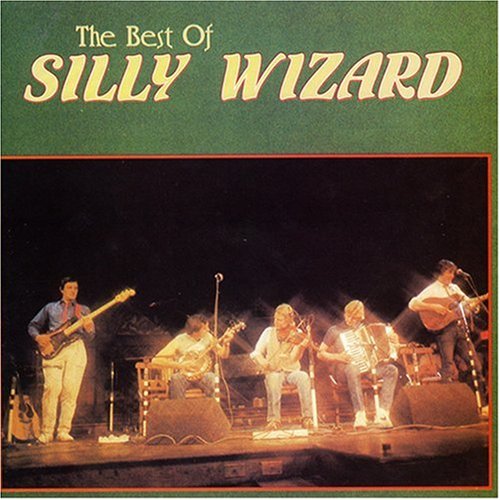 Jayme Lynn Blaschke wrote this for us.
Jayme Lynn Blaschke wrote this for us.
Despite the proliferation of traditional bands over the past decade, there remains something happily unique about Silly Wizard, probably the best-known of Scotland’s groups of this type. For one thing, they’ve got probably the catchiest name ever to grace a record. But, more importantly, Silly Wizard’s sound is an unpretentious, earthy one. There’s no gloss and polish here like you’d find on, say, an Altan disc, no studio jiggery and double-tracked harmonies that are so commonplace on a Clannad release. Not that those are necessarily bad things, mind you, but every one of the 11 tracks on The Best of Silly Wizard sound like they were recorded in one take in the studio, with the entire band playing at once, rather than the more common practice of laying down each instrument separately and mixing later. Now, I don’t know if that’s actually the way Silly Wizard recorded the music here, but the end result is that the music has all the punch and immediacy of a live performance, with none of the drawbacks that the raw sound of live shows often suffer from. And lead singer Andy M. Stewart’s got what is probably the strongest Scottish brogue you’re ever likely to hear on an album, an uncommon quirk that enhances Silly Wizard’s charm.
On The Best of Silly Wizard, a selection of plums are picked from four preceding albums, and each track is choice. The rustic, gentle “Valley of Strathmore” is a lovely piece that starts the disc off smoothly. Johnny Cunningham’s fiddle is particularly sweet, and Stewart’s singing echoes just the right touch of lovesickness on lines like, “If time was a thing man could buy/All the money that I have in store/I would give for one day by your side/In the valley of Strathmore.” That emotion is channeled into the intense passion of “The Queen of Argyll” and then changes again, becoming a desperate sadness in “The Fisherman’s Song.”best_of_
One of the most enjoyable, fun songs here is “Donald McGillavry/O’Neill’s Cavalry March,” on which Stewart’s singing is totally unintelligible. That’s irrelevant, though, since Phil Cunningham’s rowdy accordion does a fantastic impression of a whirling dervish, leaving listeners out of breath by the end of the song. It’s apparent the band was having great fun while recording this, and that fun’s infectious. That wild abandon carries over onto “Mo Chuachag Laghach (My Kindly Sweetheart),” a festive instrumental romp that pits the guitars, mandolins and banjos against the accordion and whistles in a contest of wills to see which can get the most people to get up and dance. Each instrument takes center stage for a few movements, and all jump back in for the rousing bridges. Good stuff.
“The Pearl” slows things down quite a bit, and is one of the standout instrumentals included here. The band’s skill with whistles here is quite apparent, and the layered effect with the whistles, viola and keyboards is beautiful, building deliberately as the song progresses.
From there, the album dives into “Isla Waters,” another vocal tune arranged around the accordion. This one’s a bit of a departure from the other songs represented here, sounding more like a sea chantie in style, especially with the accordion played like a concertina. And, once again, the lyrics are thoroughly garbled, sounding closer to Gaelic than the intended English. It’s not the best song here by a longshot and doesn’t hold up well against the better pieces on the disc, one of which is “Broom O’ the Cowdenknowes.” I must admit, I haven’t the faintest clue as to what this “Bonny, bonny broom” is, but the way Stewart sings it, I feel the longing for it just as strongly as he.
On the closing track, a medley of “Green Fields of Glentown/The Galtee Reel/Bobby Casey’s Number Two/Wing Commander/Donald MacKenzie’s Reel,” Gordon Jones lays down a nasty groove with his bodhran, and the rest of the band keeps up as best they’re able. The pacing shifts dramatically as they jaunt from one piece to the next with a flamboyant eagerness. Again, each instrument is showcased, but the pacing never lets up. It’s an airy, uplifting piece, and you can almost hear the laughter in between the notes.
Silly Wizard’s probably as close as you can get nowadays to the actual sound of the songs before the high-tech gloss of modern recording techniques got a hold of them. If you’re interested in finding out what you’ve been missing, what so many of these popular songs sounded like a century or more ago, then give these boys a listen. The Best of Silly Wizard is a good place to begin.


